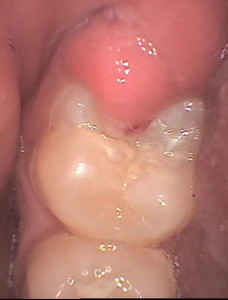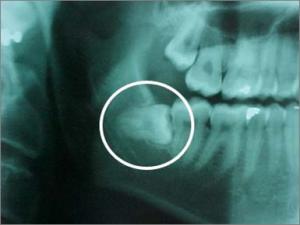Wisdom Teeth : Pain And Problems
antibiotic coverage for endo
October 29, 2013Peoples comments on circumcision
December 4, 2013Wisdom teeth
Wisdom teeth are the 3rd molars that erupt into our mouths from about age 18. These are the back teeth in each quadrant of the mouth. Often times, there is not enough room in the mouth for the wisdom teeth, and a host of problems can occur.
Pericoronits
When the wisdom teeth erupt, there is usually a little flap of gums that covers the back of the tooth. This little pocket of tissue makes it very easy for food and debris to get caught underneath it and this can create an infection.  Initially, it is tender and may bleed when brushed. People will nit clean it since it hurts. However, that only makes the problem worse, by allowing the bacteria to flourish. This causes a swelling of the gums over the wisdom teeth that can be very painful. Sometimes, patients complain of earache, neck ache, and even fever as a result of a pericoronitis.
Initially, it is tender and may bleed when brushed. People will nit clean it since it hurts. However, that only makes the problem worse, by allowing the bacteria to flourish. This causes a swelling of the gums over the wisdom teeth that can be very painful. Sometimes, patients complain of earache, neck ache, and even fever as a result of a pericoronitis.
The treatment for most of these painful wisdom teeth problems is conservative. Cleaning the soft food debris away from around the wisdom teeth will minimize the inflammation. So every time you eat, while you have the pain, you must brush the area gently to make sure it is clean. This minimizes the bacterial load. We also suggest a mouth rinse of salt water or a chlorohexadine mouthwash like Tarodent or Corsodyl. If the area is cleaned like suggested it can begin to improve in 12-24 hours.
Impacted Wisdom Teeth
Since many times there is not sufficient room in the mouth for these teeth, they erupt in all sorts of angles and locations.  There is a need for extraction many times. We often will refer them to an oral surgeon for the surgery, as it can be quite extensive. Post operative sweeping and infection is often a concern and the area must be kept clean for optimum healing. We often find a large defect in the bone after extracting wisdom teeth. We sometime will place a bone graft in the socket to ensure optimum healing.
There is a need for extraction many times. We often will refer them to an oral surgeon for the surgery, as it can be quite extensive. Post operative sweeping and infection is often a concern and the area must be kept clean for optimum healing. We often find a large defect in the bone after extracting wisdom teeth. We sometime will place a bone graft in the socket to ensure optimum healing.